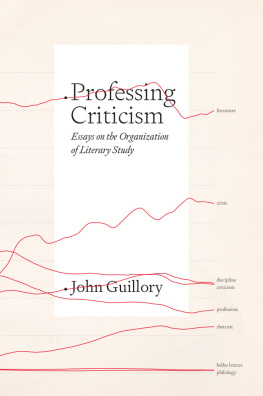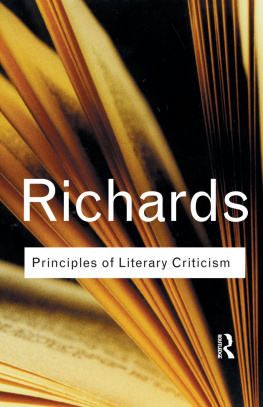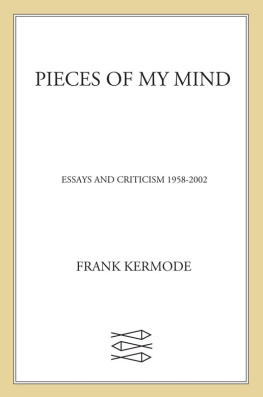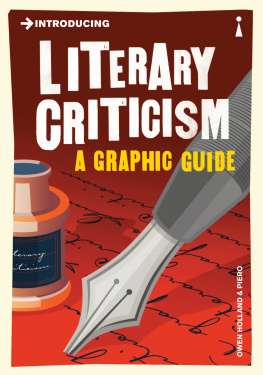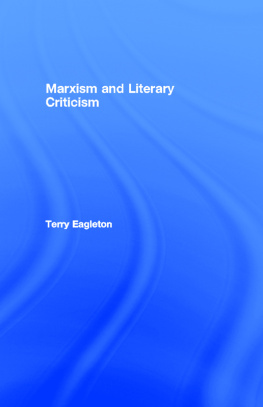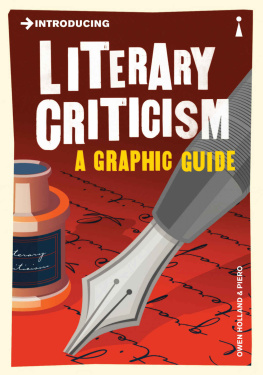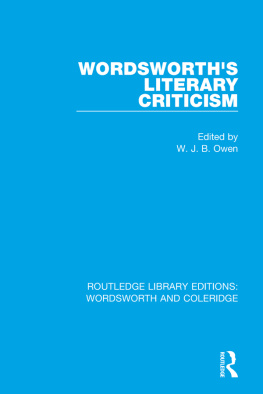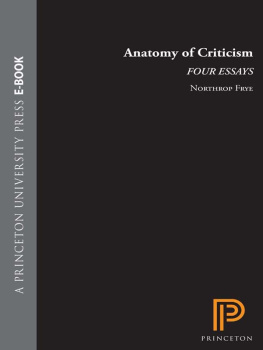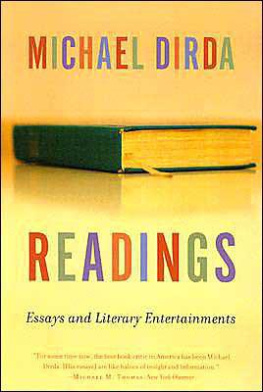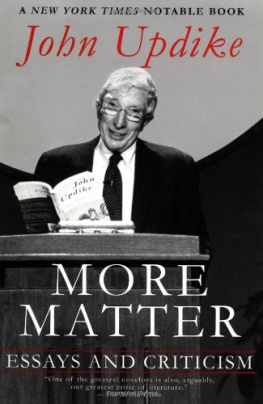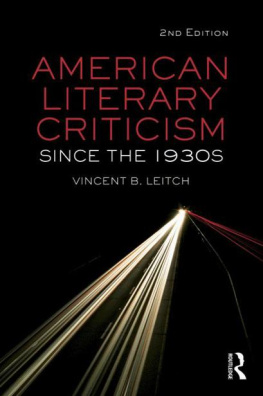John Guillory - Professing Criticism : Essays on the Organization of Literary Study
Here you can read online John Guillory - Professing Criticism : Essays on the Organization of Literary Study full text of the book (entire story) in english for free. Download pdf and epub, get meaning, cover and reviews about this ebook. year: 2023, publisher: University of Chicago Press, genre: Religion. Description of the work, (preface) as well as reviews are available. Best literature library LitArk.com created for fans of good reading and offers a wide selection of genres:
Romance novel
Science fiction
Adventure
Detective
Science
History
Home and family
Prose
Art
Politics
Computer
Non-fiction
Religion
Business
Children
Humor
Choose a favorite category and find really read worthwhile books. Enjoy immersion in the world of imagination, feel the emotions of the characters or learn something new for yourself, make an fascinating discovery.
- Book:Professing Criticism : Essays on the Organization of Literary Study
- Author:
- Publisher:University of Chicago Press
- Genre:
- Year:2023
- Rating:5 / 5
- Favourites:Add to favourites
- Your mark:
- 100
- 1
- 2
- 3
- 4
- 5
Professing Criticism : Essays on the Organization of Literary Study: summary, description and annotation
We offer to read an annotation, description, summary or preface (depends on what the author of the book "Professing Criticism : Essays on the Organization of Literary Study" wrote himself). If you haven't found the necessary information about the book — write in the comments, we will try to find it.
John Guillory: author's other books
Who wrote Professing Criticism : Essays on the Organization of Literary Study? Find out the surname, the name of the author of the book and a list of all author's works by series.
Professing Criticism : Essays on the Organization of Literary Study — read online for free the complete book (whole text) full work
Below is the text of the book, divided by pages. System saving the place of the last page read, allows you to conveniently read the book "Professing Criticism : Essays on the Organization of Literary Study" online for free, without having to search again every time where you left off. Put a bookmark, and you can go to the page where you finished reading at any time.
Font size:
Interval:
Bookmark:
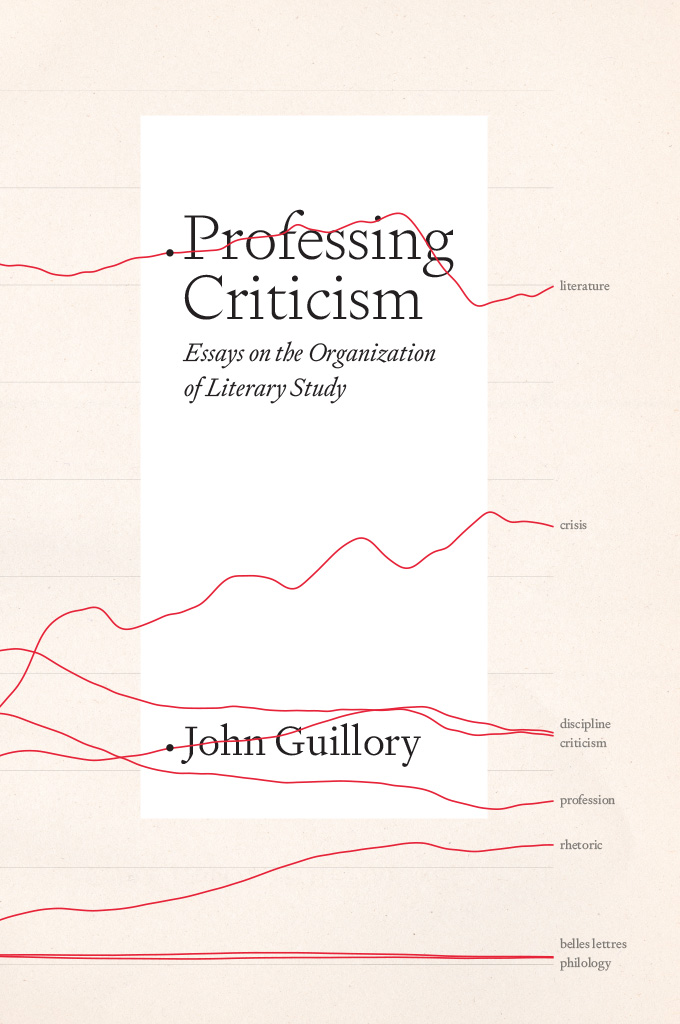
John Guillory
The University of Chicago Press
CHICAGO LONDON
The University of Chicago Press, Chicago 60637
The University of Chicago Press, Ltd., London
2022 by The University of Chicago
All rights reserved. No part of this book may be used or reproduced in any manner whatsoever without written permission, except in the case of brief quotations in critical articles and reviews. For more information, contact the University of Chicago Press, 1427 East 60th Street, Chicago, IL 60637.
Published 2022
Printed in the United States of America
31 30 29 28 27 26 25 24 23 22 1 2 3 4 5
ISBN-13: 978-0-226-82129-0 (cloth)
ISBN-13: 978-0-226-82130-6 (paper)
ISBN-13: 978-0-226-82131-3 (e-book)
DOI: https://doi.org/10.7208/chicago/9780226821313.001.0001
The University of Chicago Press gratefully acknowledges the generous support of New York University and the Abraham and Rebecca Stein Faculty Publication Fund toward the publication of this book.
Library of Congress Cataloging-in-Publication Data
Names: Guillory, John, author.
Title: Professing criticism : essays on the organization of literary study / John Guillory.
Description: Chicago : University of Chicago Press, 2022. | Includes bibliographical references and index.
Identifiers: LCCN 2022012453 | ISBN 9780226821290 (cloth) | ISBN 9780226821306 (paperback) | ISBN 9780226821313 (e-book)
Subjects: LCSH: CriticismStudy and teaching. | HumanitiesStudy and teaching. | LiteratureHistory and criticism.
Classification: LCC PN94.2.G85 2022 | DDC 801/.95071dc23/eng/20220510
LC record available at https://lccn.loc.gov/2022012453
 This paper meets the requirements of ANSI / NISO Z39.48-1992 (Permanence of Paper).
This paper meets the requirements of ANSI / NISO Z39.48-1992 (Permanence of Paper).
The title of this volume argues that if literature is studied in the university, it is criticism that is professed. My title alludes to that of Gerald Graffs landmark work, Professing Literature, which I have respectfully amended to bring out an unresolved problem in how literary study understands its purpose. The distinction between studying and professing is not trivial. University disciplines identify objects of study by differentiating these objects from others, by specialization, but professions establish the requisites and perquisites common to all the disciplines. As different as physics and literary study are, their disciplinary distinctions are submerged in the form of the profession, the notional parity of literature professors and physics professors. Where Graff offers an institutional history of our discipline, I attempt to analyze this history within the framework of a sociology of professions. The professionalization of disciplines organizes the work of teaching and research, a process that for literary study has been fraught with unintended consequences. The essays in this book consider how literary study has been organized, both historically and in the modern era, both before and after its professionalization. The sometimes adventitious and opportunistic solutions to problems in this volatile history have solidified into permanent features of our institutional landscape. For the most part, the discipline succeeds in its efforts to preserve, transmit, and study literature, yet it continues to be troubled by the relation between its disciplinary protocols and its identity as a profession. I argue in this book that the disciplines enthusiastic embrace of professionalism betrays an ambivalent relation to its amateur past, its earlier identity as criticism. Literary study attempts to resolve this ambivalence by professing criticism.
In the twentieth century, criticism was transformed into a discipline and a professionbut not in that order. As I demonstrate in of this book, our discipline inverted the usual sequence between these two processes: Literary study became a profession before it became a discipline. Driving this anomalous sequence was the belated attempt to determine the object of study in the English and modern foreign language departments, which only during the interwar period were identified with literature. The study of literature is very old, one of the oldest in Western history, but the object of the discipline, as we know, wavered in the later nineteenth century between literature and language. It was not obvious that literature was a legitimate object of disciplinary study, whereas the vernacular languages could boast a highly developed body of scholarship, an undoubted entitlement to the status of a discipline. So uncertain was the process of defining an object that for several decades in the earlier twentieth century, the discipline had no settled name at all. Teaching and research into literature were poised to achieve disciplinary status with the choice of a surprising array of names: philology, belles lettres, rhetoric, literary history. When the discipline was finally baptized, in the period after World War II, it took a new name: literary criticism.
This story is well known; it is in essence what Graffs institutional history reveals. And yet when we look at this account from the comparative perspective of other disciplines, its oddity is the chief impression. One might suppose that literature is the inevitable correspondent to the objects that define the most nearly allied disciplines of art history and music history. Even today, however, the position of literature as disciplinary object is not wholly secure, as Graff acknowledges in a new preface to his book: The very phrase teaching literature is misleading, since what teachers and students produce in literature courses is not literature, but criticismthat is, discourse about literature.
The currency of the term literary criticism is a legacy of I. A. Richardss transformative intervention into literary pedagogy. Richards saw literary criticism as a practice that could be put on a scientific basis, which would certainly have established its disciplinary credentials, but Richards did not see himself as establishing a corps of professional critics. Literary criticism was on the contrary regarded as a practice in which every reader of literature was engaged; criticism was another name for reading, whether done well or badly. His successors saw the possibility of the moment differently. In the famous statement of John Crowe Ransom, Rather than occasional criticism by amateurs, I should think the whole enterprise might be seriously taken in hand by professionals. The chapters of this volume ask, What does it mean to profess criticism? This question has never, in my view, been systematically addressed in the context of a sociology of professions. It is my hope that this framework of analysis will help to explain the perennial churn in literary study, the constant revolutionizing of its methods and objects, the agon of its professional identification. I should say at the outset, however, that my intention is not to come down in favor or disfavor of professionalism. I take the profession of criticism as given, an accomplished fact, but no less subject to analysis for that reason.
The chapters in this collection were composed initially in the hope of producing a sociologically informed history of literary study, a history that would proceed as a linear narrative. That plan ultimately proved impractical, largely because of my limitations as a scholar of English literature. The asymmetric relation between English and the modern foreign languages in the Anglo-American university makes the history of literary study very difficult to integrate into one narrative. For related reasons, the converging and diverging histories of British and American literary study are equally difficult to integrate. I write, therefore, as an American scholar of English literature, acknowledging where possible prior or parallel developments in the history of literary study in the United Kingdom and in modern foreign languages. Some moments in the story, such as the work of I. A. Richards already mentioned, were assimilated in the United States differently than in the country of their origin, where the university system permitted a more casual relation to the procedures of credentialization. For better or worse, British universities have more than caught up in recent decades with their American peers in the effort to professionalize university teaching; it is my hope that my analysis will prove relevant to that convergence in the end.
Next pageFont size:
Interval:
Bookmark:
Similar books «Professing Criticism : Essays on the Organization of Literary Study»
Look at similar books to Professing Criticism : Essays on the Organization of Literary Study. We have selected literature similar in name and meaning in the hope of providing readers with more options to find new, interesting, not yet read works.
Discussion, reviews of the book Professing Criticism : Essays on the Organization of Literary Study and just readers' own opinions. Leave your comments, write what you think about the work, its meaning or the main characters. Specify what exactly you liked and what you didn't like, and why you think so.

